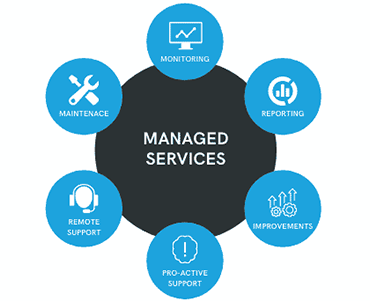Managed IT Services

Managed IT Services
Our professional services encompass the delivery of Managed IT Services, ensuring that organizations receive expert support and management for their IT infrastructure. By relying on our expertise, businesses can offload the responsibility of IT management, benefiting from proactive monitoring, security measures, data backup, technical support, and strategic consultation tailored to their specific needs.
Managed IT services refer to the outsourcing of technology-related tasks and responsibilities to a third-party service provider. These services encompass the proactive management, monitoring, and support of an organization's IT infrastructure and systems, ensuring their optimal performance, security, and reliability.
By engaging managed IT services, organizations can offload the burden of day-to-day IT management, leverage the expertise of professionals, and focus on core business activities. Our professional services encompass comprehensive managed IT solutions, tailored to the specific needs and objectives of our clients. With our support, organizations can optimize their IT infrastructure, enhance security, and benefit from reliable technical assistance and strategic guidance.
Here is an overview of managed IT services:

IT Infrastructure Management
Managed IT service providers oversee the management and maintenance of an organization's IT infrastructure, including servers, networks, and storage systems.
They handle tasks such as system upgrades, patches, and backups, ensuring the infrastructure remains up-to-date and secure.
Network Monitoring and Management
Managed IT services involve continuous monitoring of networks to identify and address any potential issues or vulnerabilities.
Providers use advanced monitoring tools to proactively manage network performance, troubleshoot problems, and optimize network resources.
Security Management
Managed IT services encompass comprehensive security management to protect against cyber threats and breaches.
Service providers implement and manage security measures such as firewalls, antivirus software, intrusion detection systems, and security audits.
They monitor and respond to security incidents, conduct vulnerability assessments, and implement security policies and best practices.
Data Backup and Disaster Recovery
Managed IT services include regular data backups and disaster recovery planning.
Service providers ensure that critical data is securely backed up and can be restored in the event of data loss or system failure.
They develop and implement disaster recovery strategies to minimize downtime and ensure business continuity.
Help Desk and Technical Support
Managed IT service providers offer help desk support to address end-user issues and technical queries.
They provide timely assistance and troubleshooting for hardware, software, and network-related problems.
Service providers may offer support through various channels, including phone, email, or remote assistance tools.
IT Consultation and Strategy
Managed IT service providers act as trusted advisors, offering strategic guidance on technology-related decisions and investments.
They assess current IT infrastructure, identify opportunities for improvement, and recommend suitable solutions aligned with business goals.
Providers stay up-to-date with emerging technologies and industry trends, ensuring clients benefit from the latest innovations.
